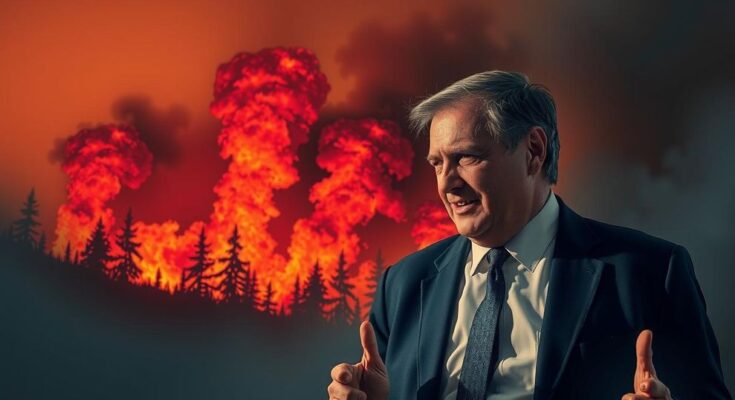Recent wildfires in Los Angeles have ignited public outrage directed at government officials for their perceived failures in crisis management, highlighting a shift in discourse from blaming climate change to demanding accountability. Mayor Karen Bass and Governor Gavin Newsom face criticism for budget cuts to fire services, resulting in increased scrutiny over disaster preparedness and infrastructure readiness.
The ongoing wildfires in Los Angeles have ignited a shift in public sentiment towards accountability among government officials. Residents are increasingly reluctant to accept the narrative posited by some political leaders, primarily from the Democratic Party, that these catastrophic events can solely be attributed to climate change. Instead, they are rightfully directing their frustrations toward leaders who they believe have neglected their duties.
For instance, Los Angeles Mayor Karen Bass faced scrutiny for her absence during the crisis and for significant budget cuts to the fire department. Furthermore, California Governor Gavin Newsom has come under fire for allegedly reducing funding for wildfire prevention measures while preserving vast amounts for climate initiatives. Citizens find themselves grappling with questions around emergency preparedness, particularly regarding the infrastructure necessary to combat such devastating fires.
The tragedy has revealed systemic issues in government management of public safety and environmental crises, prompting citizens to demand accountability from their elected officials. The immediate loss of life and property has made it evident that political narratives must contend with real-world consequences, raising awareness about the inefficiencies at hand.
The article addresses the significant wildfires that have ravaged Los Angeles, resulting in casualties and the destruction of numerous homes. This crisis has sparked a change in public discourse regarding climate change and accountability of local government officials. It highlights the growing discontent among residents towards political leaders who they perceive have failed to adequately prepare for such disasters, ultimately placing blame on government mismanagement rather than environmental factors alone. This environment of blame shifting has emerged amidst high-profile discussions around budget cuts to vital fire services and the prioritization of climate funds over immediate fire prevention expenditures. The interplay of public expectations and government responses to natural disasters forms the crux of this ongoing debate.
In light of the recent wildfires in Los Angeles, the narrative surrounding climate-related disasters is shifting dramatically. Residents are increasingly holding their elected officials accountable for perceived failures in disaster preparedness, rather than accepting climate change as the sole culprit. This shift amplifies the demand for transparency and action from those in positions of power, shedding light on larger systemic issues within government prioritization. Ultimately, the tragedy serves as a reminder that effective governance must be proactive, rather than reactive, in safeguarding communities against impending crises.
Original Source: www.telegraph.co.uk




